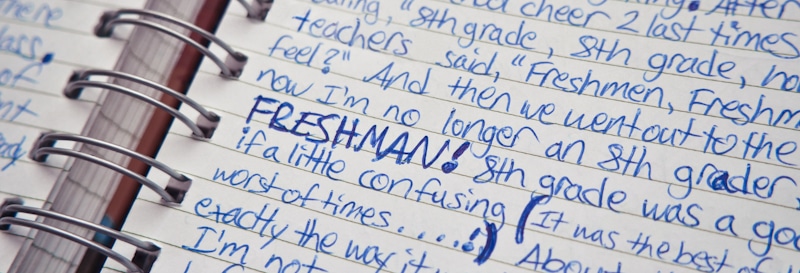Not all nouns are capitalized in sentences – only proper nouns get the “capitalization” treatment. With certain nouns, however, it could be tricky to ascertain whether they are general nouns or proper names. One such noun, for quite a few, is “freshman”.
The words “freshman” or “freshmen” are not usually capitalized as they denote a class or grade level. Also, “freshman” is a general noun, which means it has to be in lowercase throughout. However, when the word denotes an entity or organized group, it turns into a proper noun and, thus, capitalized.
If you’d like to learn more about “freshman” capitalization rules, exceptions to the same (there are a few), and also peruse a list of sentences that incorporate the word, read on.
Freshman – Definition
The word “freshman” denotes a student who is in the first year of their course at graduate school. A freshman in a high school is supposedly a pupil in 9th grade. The student is basically a beginner or an amateur. A year after being a freshman in graduate school, the student moves up the academic ladder to become a:
The “freshman” term dates back to the 16th century when it literally meant “novice” or “newcomer”. The term could be used to denote freshers not just in school or college, but pretty much in any other field. For instance, an employee in their first year with an organization could be considered as in their freshman year.
Some of the words related to “freshman” in meaning are:
- undergraduate
- rookie
- underclassman
- greenhorn
- undergrad
When used as a replacement for “freshman” in sentences, these substitute words are pretty much always written in lowercase.
Alternative, New-Gen Words for Freshman
The word “freshman” has been around for quite some time. It has, in fact, been in use for so long that the term is continually being replaced by alternative words to refer to students in the first year of their course.
Other terms meaning the same as “freshman” or “freshmen” are:
- freshpeople
- frosh
- first-year
However, not all of the newer words above are officially recognized. Only “frosh” has made its way into the English dictionary (Merriam-Webster).
The word “freshperson” or “freshpeople” is the least used of the three alternative words. It, however, is being increasingly used in political news or texts, usually referring to freshly elected congress members.
The word “frosh” came to the fore during the early part of the 20th century and has been used ever since. However, because the term has a “slangy” feel to it, its usage has been mostly relegated to informal texts.
“First-year” or “first year” is quite self-explanatory and, therefore, not necessarily treated as a new word. However, the word has been growing in usage and could show up more frequently in places where it usually was not used before.
Rules for Capitalizing “Freshman”
As mentioned above, “freshman” is a term denoting a class/grade level. Since grade levels are never treated as proper nouns, “freshman” or “freshmen” is also typically not written in capital letters. But there are exceptions to this rule, which could cause a bit of confusion.
The following are writing scenarios in which the word “freshman” is capitalized:
- Used at the beginning of a sentence
- Used in the headline or title of an article or other forms of texts
- It’s part of an official title, as in “Freshman Class of 2019”, “Freshman Orientation”, etc.
These rules apply to other college and high school grade levels as well – including “sophomore”, “senior”, and “junior”.
P.S. If the title is all lowercase, “freshman” need not be capitalized – unless and until it is the opening word of the headline or title.
Using the Adjective Form of “Freshman”
The word “freshman” is singular, and “freshmen” is plural. That’s quite self-explanatory. But if the noun is used as an adjective, it could be difficult to ascertain the form to use.
If you’re confused too like most other writers, remember it’s the singular form. In other words, it’s always “freshman years” and not “freshmen years”. This formatting is widely used and accepted in common language.
- The freshman class at the University had 2,000 students. (Correct)
- The freshmen class at the University had 2,000 students. (Incorrect)
Here is another example sentence illustrating that the number or quantity that immediately follows the word has no impact on its form: “They had more than 6,000 freshman applicants that year alone.”
Long story short, the singular noun “freshman” can serve as an adjective, while its plural form cannot.
Example Sentences with the Word “Freshman” or “Freshmen”
The following is a list of sentences using the word “freshman” or “freshmen”.
- Tim, Philip, and David all began as freshmen during the fall of 2018.
- The two freshmen have had strained relationships right from the beginning.
- My son is a high school freshman.
- She learned to cook during her freshman year so that she could eat healthily and save on her food expenses.
- Geared toward incoming freshmen and high school students, the courses have taken in only Hispanic, Native-American, and African-American students since their beginning.
- Sales were not very encouraging until my daughter, a graduate school freshman, decided to step in and shuffle things a bit.
- If a freshman doesn’t score a 2.0 (at least), they could be put on academic probation.
- Most parents buy their university-bound freshman daughter or son a brand-new laptop.
- A freshman is most likely not good at their personal finances.
- The freshman and sophomore high school years completely count, if you had any doubt.
- Many senior students wish they could go back in time and be a freshman again.
- When she got injured in a game during her freshman year, her outlook toward the sport changed completely.
- Most viewers know Bill scored the position after the freshman season of the show ended.
- All incoming freshmen must apply by the end of this month for admission.
- Incoming freshmen, quite obviously, have little to no knowledge about the on-campus party landscapes and culture.
- She hasn’t been this fat since her freshman year.
- My roommate last year was a freshman from Colorado.
- Tom and Harry are freshmen at Cornell.
- There were several hundred freshmen at the orientation program conducted last weekend.
- Did you have fun at the freshmen welcome party?
Is “Freshman” Sexist”?
Besides the datedness of the word, another reason why “freshman” could be falling in favor as a word with some people is the gender-specific “-man” part of the term. While quite a few “-man” words have been disowned (to an extent) over the years, it would be realistic to say “freshman” has only recently gone under the scanner for its orientation towards a specific gender.
Why was “Freshman” Used in the First Place?
With so much debate around making words not specific to a certain gender, the question arises, “How did a sexist word like “freshman” got coined in the first place?”
The answer to this pertinent question lies in how universities functioned in the past. In other words, back in the day, pretty much all major and lesser-known universities admitted only male students. Things, however, have changed drastically over the years, if the current education system is any sign.
Amid increasing calls for higher on-campus gender inclusivity, some universities such as Yale University (which first admitted female students in 1968), are considering replacing the “freshman” term with “first-year”, a gender-neutral word. Many peer universities, such as Cornell, Dartmouth, and Amherst have made the move already, in fact.
The Gender Bias was Not Intentional
Though the term “freshman” creates a sense of gender bias, the origin of the word clearly indicates the intention was not so. And while there are people who are in favor of changing the word to a more gender-neutral term, several others are of the opinion that replacing the word won’t address issues of gender bias in educational institutions. However, these naysayers certainly view the move to agender the name as a symbolic, positive move.
P.S. The term “freshman” may have been used because the universities only admitted male students during their initial years. The current usage of the word, however, is gender agnostic – which means even female students could be referred to as “freshman” or “freshmen”. That said, young women preferring to be addressed as a “freshwoman” is quite justified, and one also should not overlook the fact that the term “freshman” makes them gender-dysphoric.
“Freshman” is Not Going Anywhere (In the Foreseeable Future, At Least)
Despite the growing popularity of alternative terms, “freshman” is still widely in use and would stay so for some time. The above words could be used in lieu of “freshman” every now and again, but they are highly unlikely to totally boot out “freshman” for now.

In other words, references to a group of first-year students at a college or high school are more likely to use the phrase “freshman class” than “first-year class” or “frosh class”. Not to mention, the Internet is flooded with people uploading photos of their “freshman” year and not frosh year.
Conclusion
It may take some time for “freshman” to be entirely replaced with “fresho”, “first-year”, or some other term. Until the change happens, make sure you use “freshman” in your texts in lowercase – except for in scenarios mentioned above.
Shawn Manaher is the founder and CEO of The Content Authority. He’s one part content manager, one part writing ninja organizer, and two parts leader of top content creators. You don’t even want to know what he calls pancakes.



